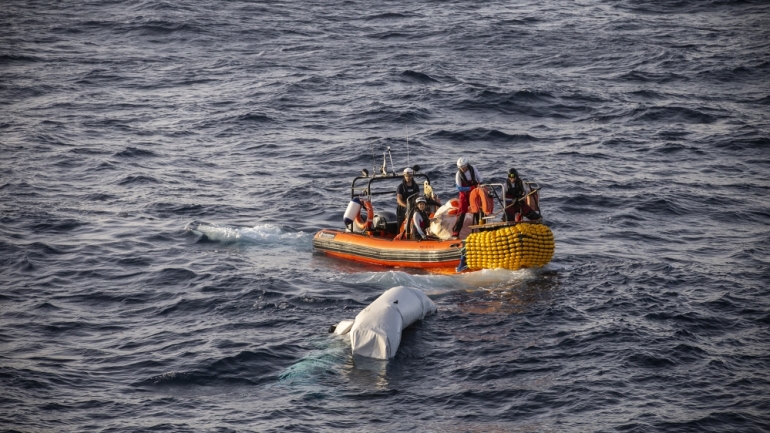Italian NGO Emergency said on Wednesday that the vessel – which has 45 women and 56 children on it, including a baby born overnight at sea – was taking on water.
It said its rescue vessel Life Support was heading towards the boat but needed another 10 hours to reach the location in Maltese waters.
The nationalities of those onboard remain unknown.
“It’s a race against time in an attempt to save as many lives as possible,” Albert Mayordomo, head of mission on the Life Support, said in a statement sent to Al Jazeera. “The absence of coordination on the part of the authorities is a grave violation of the law of the sea.”
Emergency said it had contacted Maltese authorities, in line with maritime procedures, but had received no response since Tuesday when the vessel was flagged by Alarm Phone, a non-governmental organisation that relays distress calls from the Mediterranean to emergency services.
🆘 ~500 people adrift in the Central Mediterranean!
Alarm Phone was alerted by a large boat in distress. The people report that they fled from #Libya several days ago & that their engine has stopped. Authorities are informed – rescue efforts are needed urgently & without delay! pic.twitter.com/WqkgFSSaqO
— Alarm Phone (@alarm_phone) May 23, 2023
Emergency said it also had forwarded a request for assistance to the Italian Maritime Rescue Coordination Center, which responded by saying that the case falls under the mandate of Maltese authorities.
The Maltese coastguard did not respond to Al Jazeera’s requests for comment while Italian authorities declined to comment.
Paolo Fusarini, captain of Life Support, said his crew was preparing for a difficult night-time rescue.
“Weather conditions are not favourable,” he said in a statement sent to Al Jazeera. “We are going towards waves of 1.5 meters that will make the operation more difficult.”
Fusarini said he was not too hopeful of reaching the location in time and feared that many people would drown before Life Support gets there.
On Tuesday, Alarm Phone said local authorities had been informed of the boat’s presence without specifying whether they were Maltese or Italian officials.
Shortly after, German NGO Sea-Watch said it had sent its light observation aircraft, Sea Bird, to locate the vessel.
On Wednesday, Alarm Phone said it had lost contact with the boat.
“We lost contact this morning, after we continuously alerted & updated the authorities in #Malta and #Italy,” it said. “500 people cannot simply disappear!”
Sea-Watch was unable to locate the boat and said in a tweet, “The fact that the Maltese sea rescue coordination center ignored our calls is unacceptable. We demand immediate clarification.”
More than 45,000 migrants and refugees have arrived in Italy over the Mediterranean so far this year, the highest number since 2017.
About 1,090 people are estimated to have died or gone missing in the Mediterranean since January, according to the International Organization for Migration.
‘Italy delays, Malta ignores’
This month, the European Council on Refugees and Exiles, a European network of 105 NGOs in 39 European countries, summed up the situation at play in the Mediterranean: “Italy delays, Malta ignores, Tunisia and Libya pull back and abuse.”
“The Italian authorities continue the policy of assigning distant ports to NGO rescue vessels for the disembarkation of survivors,” it said. “Malta failed to rescue more than 7,000 people in distress in the country’s SAR [search and rescue] zone in 2022 and reports of non-response tactics continue to mount.”
On January 2, the Italian government passed legislation requiring captains of rescue ships to request a port immediately after a rescue rather than continuing at sea and assisting with multiple distress calls.
Authorities have increasingly been assigning distant ports for disembarkation, which NGOs say is raising costs and decreasing efficiency.

Italian Prime Minister Giorgia Meloni has rejected claims that government policies to discourage migration played a role in a shipwreck off the nation’s southern coast in March, in which at least 72 people died.
Almost two weeks after the shipwreck, Italy’s coastguard conducted a large rescue operation, bringing more than 1,000 people stranded on three boats in distress to safety.
The Maltese government has also faced criticism. A report published in March this year by the Civil Maritime Rescue Coordination Centre, a network of non-governmental actors engaging in search and rescue activities in the Mediterranean, concluded that “at sea, Maltese authorities regularly abandon those in need of rescue”.
The report said that in 2022, Maltese authorities ignored more than 20,000 people in distress, 413 boats with people needing help were not assisted and only three boats were rescued by Malta’s armed forces.
“Non-assistance is now a routine part of a suite of deadly measures aimed at reducing arrivals in Malta,” the report said.
So far in 2023, only 92 people have been rescued by Maltese authorities.
